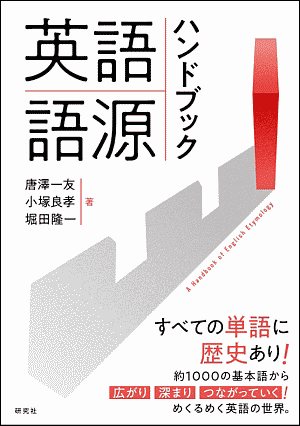2026-01-19 Mon
■ #6111. Morris の Austral English の序文より [australian_english][dictionary][lexicography][lexicology][oed][melbourne][new_zealand_english]
昨日の記事「#6110. Edward Ellis Morris --- オーストラリア英語辞書の父」 ([2026-01-18-1]) に引き続き,Morris と彼が編纂した辞書 Austral English (1898年刊行)について.この辞書の序文に当たる "ORIGIN OF THE WORK" というセクションに,後に完成する OED との関係が明記されている.
. . . the noblest monument of English scholarship is The New English Dictionary on Historical Principles, founded mainly on the materials collected by the Philological Society, edited by Dr. James Murray, and published at the cost of the University of Oxford. The name New will, however, be unsuitable long before the Dictionary is out of date. Its right name is the Oxford English Dictionary ('O.E.D.'). That great dictionary is built up out of quotations specially gathered for it from English books of all kinds and all periods; and Dr. Murray several years ago invited assistance from this end of the world for words and uses of words peculiar to Australasia, or to parts of it. In answer to his call I began to collect; but instances of words must be noted as one comes across them, and of course they do not occur in alphabetical order. The work took time, and when my parcel of quotations had grown into a considerable heap, it occurred to me that the collection, if a little further trouble were expended upon it, might first enjoy an independent existence. Various friends kindly contributed more quotations: and this Book is the result.
このような事情で,このオーストラリア・ニュージーランド英語の辞書は OED と連動して生み出された点でユニークである.以下,Kel (92--100) の記述を参考に,Austral English をめぐる注目すべき事柄をいくつか示そう.
・ Morris が主に収集したのは (1) 既存の英単語だが意味・用法が異なる "altered words",そして (2) アボリジニー諸言語からの借用語である.
・ オーストラリアのイギリス植民地としての歴史は当時まだ120年ほどの短いものだったが,それでも約2000の見出し語を含む500ページに及ぶ辞書が編纂されたというのは,対蹠地における造語の豊かさ物語っている.
・ 編纂方法が OED と同じ「歴史的原則」に基づいていたというのも辞書編纂史上,特筆すべき出来事である.OED の完成は Austral English の30年後の1928年だったことを考えると,ある意味では,歴史的原則に基づいた学術的な英語辞書の一番乗りだったともいえる.
・ kangaroo の項目は7ページに及ぶ.
・ この辞書には批判もあった.Morris は本質的にイギリス出身のエリート学者であり,オーストラリア英語を最も顕著に特徴づける話し言葉や俗語には注意を払っていない,という批判だ.Morris の選語は書き言葉に偏っており,網羅性に欠けていた,と.確かにその通りだが,それは OED とておおよそ同じ状況だったことは考え合わせておいてよいだろう.
・ Morris, Edward Ellis, ed. Austral English: A Dictionary of Australasian Words, Phrases and Usages. London: Macmillan, 1898.
・ Richards, Kel. The Story of Australian English. Sydney: U of New South Wales, 2015.
2026-01-18 Sun
■ #6110. Edward Ellis Morris --- オーストラリア英語辞書の父 [australian_english][dictionary][lexicography][lexicology][oed][link][biography][melbourne][new_zealand_english]

(Photograph of Edward Morris, by Johnstone, O'Shannessy & Co, c1900, State Library of Victoria, H4705)
オーストラリアの Melbourne と英語史を掛け合わせると,Edward Ellis Morris (1843--1902) の名前が浮かび上がってくる.1898年に Austral English: A dictionary of Australasian words, phrases and usages with those aboriginal-Australian and Maori words which have become incorporated in the language, and the commoner scientific words that have had their origin in Australasia と題するオーストラリア英語・ニュージーランド英語の語彙を集め,初めて本格的に辞書を編纂した人物である.
当時 Oxford にて New English Dictionary (後の Oxford English Dictionary)を編纂していた James Murray (1837--1915) は,世界中の有志に呼びかけ,英単語の引用文例を収集していた.オーストラリア英語からの素材を提供していた有志こそが,メルボルン大学の現代語・文学の教授 Morris その人だった.後にその素材を独立させて辞書として編んだのが,Austral English である.
Morris は,1843年,英領インドで会計課長を務めていた父のもと Madras で生まれた.教育はイギリスで受け,ラグビー学校やオックスフォード大学でエリートとして育ち,古典,法律,近代史を学び,フランス語やドイツ語を習得した.1875年,メルボルン英国教会グラマースクールの校長に任命されてオーストラリアに渡り,生涯をその地で過ごした.1884年にはメルボルン大学の教授として招かれ,現代語・文学で教鞭を執った.1902年,滞在中のイングランドで他界し,ロンドンの Kensal Green Cemetery に眠っている.
Morris は敬虔なクリスチャン,慈善家,教育家だった.1884--88年には Melbourne Shakespeare Society を創設し初代会長となっている.このように多分野で活動した Morris の多くの著作のうち最も著名なものが,オーストラリア英語研究の記念碑というべき Austral English である.Morris はこの著作により,1899年に同大学最初の文学博士号を授与されている.現代まで続くオーストラリア英語辞書の系譜の祖といってよい.
・ Biography by Australian Dictionary of Biography
・ Biography by Dictionary of Australian Biography
・ Biography by People Australia
・ Wikipedia
・ Austral English: A Dictionary of Australasian Words, Phrases and Usages by Project Gutenberg
・ Morris, Edward Ellis, ed. Austral English: A Dictionary of Australasian Words, Phrases and Usages. London: Macmillan, 1898.
2025-10-04 Sat
■ #6004. slang の役割について凝縮した読ませる文章で教えてくれる章 --- HEL in 100 Places より [100_places][helgrim][helkatsu][slang][dictionary][lexicology][lexicography]
目下,New Zealand に来ている.持参した書籍の1つが,本ブログでも最近たびたび取り上げている A History of the English Language in 100 Places である.
NZ 関係の記述としては「#5974. New Zealand English のメイキング」 ([2025-09-04-1]) で紹介した第52節があったが,意外なところにもう1節あった.それは第66節 "GISBORNE --- English slang (1894)" である.
Gisborne は NZ 北島東岸の港町である.この町で英語辞書編纂界の巨人 Eric Partridge (1894--1979) が生まれたという理由で,この節にて英語の slang の話しが展開されることになるのだ.Partridge の業績のなかでもとりわけ名高いのが,A Dictionary of Slang and Unconventional English (1937) である.この初版以来,現在まで改版が続いている影響力のある英語俗語辞書だ.
1ページ半ほどの短い節だが,ここに slang の捉えどころのなさ,怪しさ,魅力が詰め込まれている.slang の役割についての記述も,さりげなくではありながらも本質を突いている.ここでは最後の1節を引こう.
The aim of people using and creating slang is to make up words that are not in the dictionary in order to shock, delight, amaze, intrigue and mystify. Friends and enemies alike can be the objects of this verbal gaming, but slang users have to contend with the online glossaries that are being constantly updated. The best of these is Urban Dictionary; it boasts over 6 million definitions. Hard copy slang dictionaries are far behind; the Oxford Dictionary of Slang (2003) can boast no more than 10,000 slang words and phrases. Moreover, as a word moves from speech to print and from print to dictionary, its slanginess must steadily decrease.
今後,英語の slang 辞書編纂は,一般の辞書編纂に比べても,はるかに早く紙から遠ざかっていくだろうことが確信される.紙の辞書に捕捉された時点で,slang はその本質的な性質を半ば失っているということになるからだ.語彙変化や意味変化の領域における slang の影響力は思いのほか大きい.slang は言語変化の現場である.
・ Lucas, Bill and Christopher Mulvey. A History of the English Language in 100 Places. London: Robert Hale, 2013.
2025-08-11 Mon
■ #5950. ウェブ月刊誌 Helvillian の8月号が公開されました [helwa][heldio][notice][helmate][helkatsu][helvillian][link][hee][dictionary][lexicography][gcs]
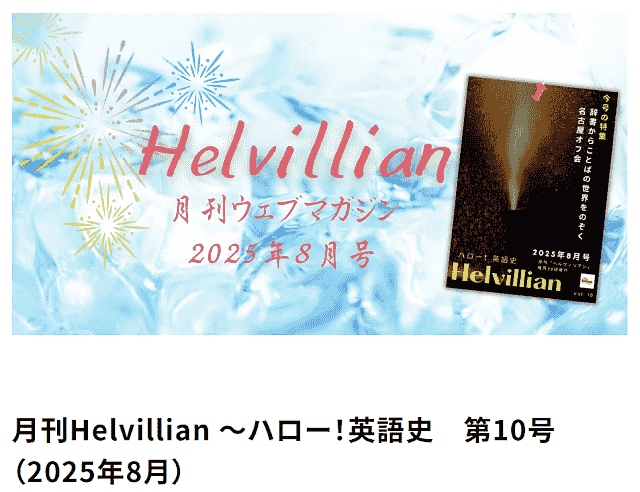
7月28日,helwa のメンバー有志が note 上で毎月制作している hel活 (helkatsu) ウェブマガジン『月刊 Helvillian 〜ハロー!英語史』の2025年8月号が公開されています.毎月順調に続いており,今号で通算第10号となります.
表紙のことばは,コアリスナーの Ko さんの手筒花火の写真とエッセイ.三河で約450年の歴史をもつ伝統行事とのことです.盛夏を感じさせます.行事も熱い,hel活も熱い!
続いて今号の特集.「辞書からことばの世界をのぞく」と題して,辞書 (dictionary) や辞書学 (lexicography) に関して書かれた記事が寄せ集められています.その筆頭を飾るのは,英語史研究者泉類尚貴さん(関東学院大学)による「OED の弱点?:構文研究を例に」です.大補文推移 (Great Complement Shift; gcs) を例題として,OED をコーパスとして用いることの是非を論じています.その後,川上さん,mozhi gengo さん,ari さんからの特集に関連する複数の記事が続きます.
今号の特集の2つめは6月29日に開催された「名古屋オフ会」です.オフ会をもろもろ手配していただいた Lilimi さんによるルポ,および私自身のルポが掲載されています(掲載していただきありがとうございます!).
今号は,『英語語源ハンドブック』刊行直後の時期に制作が始まったため,同書についても多くの記事を寄せていただきました.著者の1人として,盛り上げに貢献いただきまして感謝申し上げます.ari さん,り~みんさん,mozhi gengo さん,金田拓さん,umisio さんによる寄稿がありました.
連載やその他のレギュラー記事も健在です.みーさんの「教室日誌」,camin さんの "faux amis" シリーズ,ari さんの英語史・英語教育ブログ,川上さんの「素朴な疑問」記事,mozhi gengo さんの印欧語ブログ(そろそろこう呼んでよいですね)などの記事群です.また,しーさんの「英語の語源を立体的に楽しむ方法」は,私自身が掲げている「英語史探求の3点セット」の有効な使い方を披露してくださっています.金田拓さんの「Helvillian 7月号を読んで,古英語世界に足を踏み入れよう!」は Helvillian と古英語へのエールです.umisio さんによる記事「ito エンジョイ2回目」は,カードゲーム ito の魅力を改めて伝えています.
今号の締めくくりは,Galois さんによる「Helwa のあゆみ/活動報告(2025年8月)」と「Helvillian 編集後記(2025年8月)」です.helwa 周辺のhel活の過去,現在,未来が展望されています.
月刊 Helvillian は,helwa コミュニティによる活発なhel活の賜物です.ぜひ多くの皆さんに Voicy プレミアムリスナー限定配信チャンネル「英語史の輪 (helwa)」のメンバーになっていただき,hel活に参加いただければ幸いです.
Helvillian のバックナンバーはこちらのページにまとまっています.hellog の helvillian タグのついた各記事もお読みください.
今号については,Voicy heldio でも2回ほどご紹介しています.とりわけ後者は編集員や寄稿者との直々の対談となっていますので,ぜひお聴きください.
・ 「#1521. Helvillian 8月号が公開! --- 特集は「辞書からことばの世界をのぞく」
・ 「#1532. Helvillian 8月号の紹介 by 編集委員 --- プチ英語史ライヴ from 横浜」
2025-06-19 Thu
■ #5897. 『英語語源辞典』と『英語語源ハンドブック』の関係 [hee][kdee][kenkyusha][etymology][dictionary][lexicography][notice][review][terminology][kenkyusha]
昨日,共著者の一人として執筆に加わった『英語語源ハンドブック』が,研究社より刊行されました.長年 hellog で探求してきた英語史,とりわけ英単語の語源のおもしろさを,より多くの方に届けたいという思いが,関係者の方々の強力なイニシアチブのもとで,1冊の本として結実しました.
本書の射程をどこに置くかという議論のなかで,企画当初より常に念頭にあったのは,寺澤芳雄先生が編集主幹を務められた『英語語源辞典』(研究社)です.この辞典は,hellog でも繰り返し述べて推してきた通り,「日本の英語系出版史上の金字塔」です(「#5553. 寺澤芳雄(編集主幹)『英語語源辞典』(研究社,1997年)の新装版 --- 「いのほた言語学チャンネル」でも紹介しました」 ([2024-07-10-1]) を参照).この辞典は英単語の語源に関心をもつすべての学習者・研究者にとって必携のレファレンスであり,その学術的価値は計り知れません.
では,この偉大な『英語語源辞典』がすでに手に入るときに,なぜ新たに『英語語源ハンドブック』を企画したのでしょうか.それは,両者の役割が明確に異なるからです.『辞典』が個々の単語の歴史を深く掘り下げる「縦の探求」のためのツールだとすれば,『ハンドブック』は英語語源の世界全体を広く見渡し,英語史の観点から様々な話題のあいだの関連性を知る「横の探求」を促すためのツールといえます.
hellog や heldio では,語源学 (etymology) のおもしろさと難しさについてに語ってきました.断片的な証拠を集め,推理を重ねて単語の真相に迫っていく知的な興奮は,語源探求の醍醐味です.しかし,そのためには,いくつかの基本的な探求手法や思考フレームワークを知っておく必要があります.例えば,借用 (borrowing),文法化 (grammaticalisation),メトニミー (metonymy) などの現象・用語の理解は,語源を考える上で土台となる知識です.
『英語語源ハンドブック』は,この土台作りに貢献する本です.個々の単語の語源解説に終始するのではなく,これらの英語史・語源学の基本的な概念を,具体的な事例と結びつけながら平易に解説することを目指しています.これは,日々 hellog の記事や heldio の音声配信で実践しようと試みているアプローチ,すなわち,専門的な知見をいかに噛み砕き,その魅力を伝えるかという私の関心の方向にも完全に合致します.
一方で『英語語源辞典』は,そのようにして基本的な知識と見方を身につけた探求者が,個別の事例,すなわち個々の単語の語源に深く分け入っていく際に,最も信頼できるレファレンスとなります.『ハンドブック』で全体像をつかんだ後,自らの知的好奇心に導かれて『辞典』の項目を引けば,そこに記された情報の価値や記述の深さを,より実感をもって味わうことができるはずです.
このように,『ハンドブック』と『辞典』は,互いに競合するものではなく,むしろ相互に補完し合い,探求者を語源のより深い世界へと導くための理想的な連携関係にあります.『ハンドブック』をきっかけとして語源のおもしろさに目覚め,さらに『辞典』を相棒として本格的な探求の旅に出る --- そのように両書を活用していっていただければと思います.両書とも必携です!
私がこの2年ほど続けてきた『英語語源辞典』の推し活については,「#5856. 私の『英語語源辞典』推し活履歴 --- 2025年5月9日版」 ([2025-05-09-1]) およびそこからリンクを張った記事をお読みください.
・ 唐澤 一友・小塚 良孝・堀田 隆一(著),福田 一貴・小河 舜(校閲協力) 『英語語源ハンドブック』 研究社,2025年.
・ 寺澤 芳雄(編集主幹) 『英語語源辞典』新装版 研究社,2024年.
2025-05-09 Fri
■ #5856. 私の『英語語源辞典』推し活履歴 --- 2025年5月9日版 [notice][kdee][youtube][link][etymology][review][voicy][heldio][lexicography][asacul]
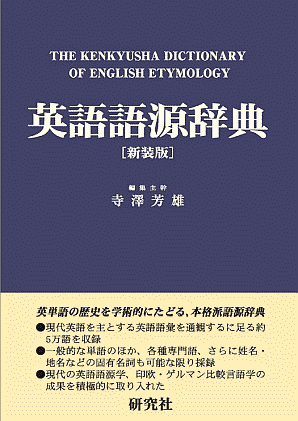
たまに振り返ってみるシリーズです.これまでの『英語語源辞典』推し活履歴は,以下の記事をご参照ください.
・ 「#5210. 世界最強の英語語源辞典 --- 寺澤芳雄(編集主幹)『英語語源辞典』(研究社,1997年)」 ([2023-08-02-1])
・ 「#5261. 研究社会議室での3回にわたる『英語語源辞典』をめぐるインタビューが完結」 ([2023-09-22-1])
・ 「#5436. 私の『英語語源辞典』推し活履歴 --- 2024年3月15日版」 ([2024-03-15-1])
・ 「#5522. 私の『英語語源辞典』推し活履歴 --- 2024年6月9日版」 ([2024-06-09-1])
・ 「#5553. 寺澤芳雄(編集主幹)『英語語源辞典』(研究社,1997年)の新装版 --- 「いのほた言語学チャンネル」でも紹介しました」 ([2024-07-10-1])
今回は2024年7月11日以降の推し活履歴を時系列に一覧します.2024年度の朝カル講座「語源辞典でたどる英語史」の関連が多いので,これについては特にこちらの記事群ご覧ください.ほかには kdee タグのついた記事群も参照.
・ 2024年07月26日 heldio で「#1153. 『英語語源辞典』を読むシリーズ (8) --- khelf 藤原くんと king の項を精読する」が公開される.
・ 2024年07月27日 朝カルのシリーズ講座「語源辞典でたどる英語史」の第4回「現代の英語に残る古英語の痕跡」が開講される.
・ 2024年08月24日 heldio で「#1182. 【緊急のご報告】研究社『英語語源辞典』新装版が重版決定!」が公開される.
・ 2024年08月24日 朝カルのシリーズ講座「語源辞典でたどる英語史」の第5回「英語,ラテン語と出会う」が開講される.
・ 2024年09月28日 朝カルのシリーズ講座「語源辞典でたどる英語史」の第6回「英語,ヴァイキングの言語と交わる」が開講される.
・ 2024年09月08日 khelf 主催の「英語史ライヴ2024」の英語史クイズにて,研究社のご提供により『英語語源辞典』が景品とされる.
・ 2024年09月08日 khelf の『英語史新聞』第10号と号外にて,『英語語源辞典』制作にかかわる貴重なエピソードが紹介される.
・ 2024年09月20日 『はじめての英語史』と『英語語源辞典』が読売新聞朝刊のサンヤツ広告に掲載される.
・ 2024年09月23日 heldio で「#1212. 『英語語源辞典』の「語源学解説」精読 --- 「英語史ライヴ2024」より」が公開される.
・ 2024年10月21日 heldio で「#1240. 『英語語源辞典』の「語源学解説」精読 (2) --- KDEE の編集方針を理解しよう」が公開される.
・ 2024年10月26日 heldio で「#1236. mine を『英語語源辞典』で読み解く」が公開される.
・ 2024年10月26日 朝カルのシリーズ講座「語源辞典でたどる英語史」の第7回「英語,フランス語に侵される」が開講される.
・ 2024年11月14日 heldio で「#1264. 『英語語源辞典』通読はキツい,無理!」が公開される.
・ 2024年11月16日 heldio で「#1266. chair と sit --- 『英語語源辞典』精読会 with lacolaco さんたち」が公開される.
・ 2024年11月30日 朝カルのシリーズ講座「語源辞典でたどる英語史」の第8回「英語,オランダ語と交流する」が開講される.
・ 2024年12月21日 朝カルのシリーズ講座「語源辞典でたどる英語史」の第9回「英語,ラテン・ギリシア語に憧れる」が開講される.
・ 2024年12月26日 heldio で「#1306. 『英語語源辞典』の「語源学解説」精読 (3) --- 印欧語比較言語学の学史をたどる」が公開される.
・ 2025年01月25日 朝カルのシリーズ講座「語源辞典でたどる英語史」の第10回「英語,世界の諸言語と接触する」が開講される.
・ 2025年02月08日 朝カルのシリーズ講座「語源辞典でたどる英語史」の第11回「英語史からみる現代の新語」が開講される.
・ 2025年03月15日 朝カルのシリーズ講座「語源辞典でたどる英語史」の第12回「勘違いから生まれた英単語」が開講される.
・ 2025年04月25日 heldio で「#1426. 『英語語源辞典』をランダム読み --- khelf メンバーとの思いつき企画」が公開される.
・ 2025年04月27日 heldio/helwa リスナーの ari さんが『英語語源辞典』で一人遊びするアプリを開発し,note 上で公表する:「#264 【KQ1】Voicy の KDEE の単語遊びを ChatGPT で体験してみた!」.アプリの改訂版は2日後のこちら:「#266【KQ2】ゴラクエを update して遊ぶ!!」.
・ 2025年05月01日 khelf の寺澤志帆さんが,連載「『英語語源辞典』でたどる英語綴字史」を開始する.
・ 2025年05月04日 heldio/helwa リスナーの lacolaco さんによる note 上の「英語語源辞典通読ノート」が順調に継続しており,crash まで達している.
khelf メンバーやヘルメイトさんとも力を合わせ,ものすごい活動になってきました.皆さんも,どのような形であれ,ぜひ KDEE 推し活にご参加いただければ!
・ 寺澤 芳雄(編集主幹) 『英語語源辞典』 研究社,1997年.
2025-04-28 Mon
■ #5845. 『ことばと文字』特集「語彙と文字の近代化 --- 対照言語史の視点から」の各論考の概要をご紹介 [contrastive_language_history][review][heldio][lexicography][orthography]
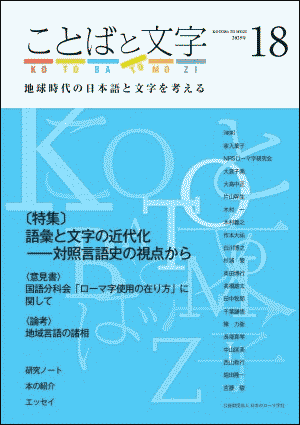
3週間前に一度「#5824. 近刊『ことばと文字』18号の特集「語彙と文字の近代化 --- 対照言語史の視点から」」 ([2025-04-07-1]) の記事を公開しました.この特集企画を掲載した『ことばと文字』18号が,先日4月25日に発売となりましたので,このタイミングであらためて特集企画をご紹介したいと思います.
特集のタイトルは「対照言語史から見た語彙と文字の近代化」です.日本語史の田中牧郎氏(明治大学),ドイツ語史の高田博行氏(学習院大学),英語史の堀田隆一(慶應義塾大学)が中心となり、日本語・中国語・英語・ドイツ語・フランス語の5言語(史)の専門家とともに進めてきた企画が,今回実現した次第です.
特集では,各言語史の専門家がそれぞれの言語における語彙と文字の近代化について論じており,さらに一部の論文(以下で★印のついているもの)には他の言語史の研究者からのコメントが付され,言語間の対照がより深くなされています.以下,序論にまとめられている各論文の概要を,さらに要約してご紹介します.
【 日本語史・中国語史 】
・ 田中牧郎 ★「日本語の語彙と文字・表記の近代化」
19世紀後半の西洋語翻訳を機に,新メディアの表現者たちの工夫で語彙が近代化し,啓蒙家や国家主導の言語改革で文字・表記が近代化されたことをコーパスで実証しています.
・ 木村一 「西洋言語との接触による文字の近代化」
16世紀にキリシタンがもたらしたローマ字は音節をより細分化して示す点で画期的でしたが,日本語の文字史に加わった過程とその意義を考察しています.
・ 高橋雄太 「近代語の表記の変遷からみる「当用漢字表」」
近代化に伴う教育普及の課題に対し,初めて実効性を持った漢字政策「当用漢字表」(1946年)がどう設計されたかを解説しています.
・ 陳力衛 「日本語における漢語語彙の近代化」
明治初期に急増した漢語について,「早見漢語便覧」を例に形態・意味から検証し,淘汰と定着の要因を探り,近代化プロセスを考察しています.
・ 千葉謙悟 ★「中国語における語彙と漢字の近代化 --- 北京語の革新と鋳造活字の誕生」
北京語彙に官話語彙や新漢語を取り込んで語彙が近代化し,それを支えた活字創製と印刷書体確立の過程を跡づけています.
【 英語史・ドイツ語史・フランス語史 】
・ 堀田隆一 ★「英語語彙の近代化 --- 英語史におけるギリシア借用語」
英語語彙におけるギリシア語の存在感を歴史的に論じ,15世紀以降の借用,18世紀以降の科学技術発展における新語形成が近代化・国際化に果たした役割を指摘しています.
・ 家入葉子 「15世紀英語の綴り字のバリエーションとその収束 --- Pepys 2125 写本の事例から綴り字研究の課題を考える」
特定写本から15世紀英語の綴り字変異を調査し,音韻変化だけでなく政治社会の変化や分布も考慮すべきことを論じています.
・ 中山匡美 「後期近代英語期の綴り字改革 --- 挫折と成功」
18--20世紀の綴り字改革が英米で異なる動機で試みられたこと,その抜本改革は失敗したものの Webster の一部修正綴りは定着したことなどの経緯を記述しています.
・ 高田博行 ★「ドイツ語の語彙と綴字法の近代化」
17世紀に注目された形態論的原理が,綴字法の近代化と語彙形成の両方で参照され,専門術語形成や語彙の自国語化を促したことを指摘しています.
・ 大倉子南 「ドイツ語史における文字の近代化 --- イデオロギー化された文字」
フラクトゥーア書体とアンティカ書体の使用をめぐる論争から近代化が始まり,イデオロギーにより前者が長く保持された歴史を跡づけています.
・ 西山教行 ★「フランス語の近代化における辞書の貢献」
アカデミー・フランセーズ辞書,特にフランス革命期の第5版がフランス語の近代化に果たした役割を分析し,人為的な近代化と新語の盛衰を指摘しています.
・ 片山幹生 「豊穣なる混沌 --- ルネサンス期のフランス語における語彙の拡張」
16世紀フランス語語彙の画期的な発展に注目し,ラテン語・イタリア語からの借用が主因だったこと,また世紀後半には独自の洗練を目指す意識の高まったことを論じています.
各言語が「近代」という時代にどのように向き合い,語彙とそれを書き留める手段である文字を整備していったのか.その道筋は言語ごとに多様でありながらも,他言語からの影響,国家や知識人の役割,規範意識,技術革新といった共通のテーマも見え隠れします.本特集を通じて,読者の方々がご自身の関心のある言語史と比較しながら,他の言語の歴史にも目を向けるきっかけとなれば幸いです.コメント付き論文はもちろん,ぜひ各論文を読み比べて,知的刺激に満ちた対照言語史の世界に浸っていただければ.
・ 田中 牧郎・高田 博行・堀田 隆一(編) 特集「語彙と文字の近代化 --- 対照言語史の視点から」『ことばと文字18号:地球時代の日本語と文字を考える』(日本のローマ字社(編)) くろしお出版,2024年4月25日.4--136頁.
2025-04-24 Thu
■ #5841. クリストファー・バーナード(著)『英語句動詞分類辞典』(研究社,2025年) [review][notice][dictionary][lexicography][kenkyusha][syntax][word_order][verb][adverb][preposition][particle][idiom]
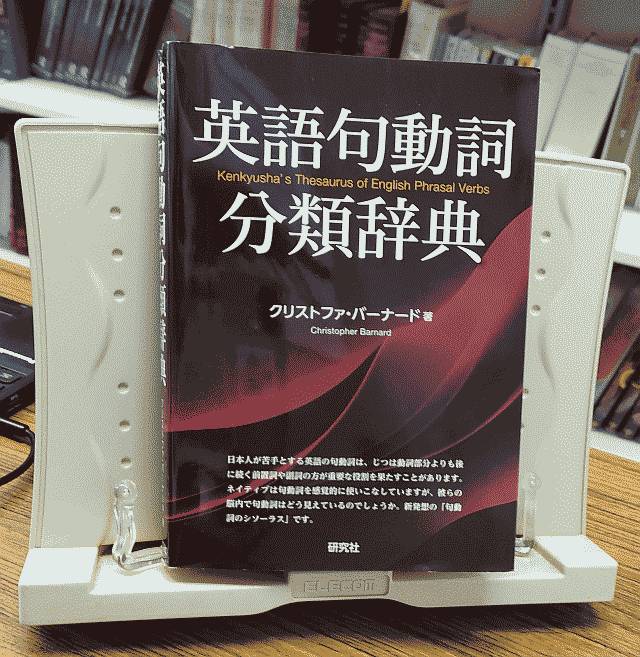
目下話題のクリストファー・バーナード(著)『英語句動詞分類辞典』(研究社,2025年) (Kenkyusha's Thesaurus of English Phrasal Verbs) を入手し,パラパラ読んでいます.同著者による前著『英語句動詞文例辞典: 前置詞・副詞別分類』(研究者,2002年)に加筆修正が加えられた本です.句動詞 (phrasal_verb) の「辞典」ではあるのですが,豊富な例文を眺めつつ最初から読んでいける(ある意味では通読を想定している)句動詞学習書というべきものです.
前著をしっかり使っても読んでもいなかった私にとっては,辞典の狙いも構成も新しいことずくめで,文字通りに新鮮な体験を味わっています.適切にレビューするためには,ある程度使い込んで,この辞典の世界観を体得してからのほうがよいのではないかと思いつつも,まずは驚きを伝えておきたいと思った次第です.私の目線からの驚き項目を,思いつくままに箇条書きしてみます
・ 句動詞の分類の主軸を,動詞ではなく,(副詞・前置詞で表わされる)パーティクル (particle) に置いている.
・ 「接近・到着・訪問」「回帰・繰り返し」「分離・除去・孤立化」など33の「テーマ」が設けられている.比較的少数のテーマでまとめ上げることができるということ自体が驚きポイント.
・ 句動詞のとる統語パターンを,読み解きやすい記号で示すなど,情報の提示の仕方に並々ならぬこだわりがみられる.
・ 目次(テーマ別),パーティクル-タグ対照索引,パーティクル別英和対照索引,総索引など,辞典に複数の引き方が用意されている.
・ 豊富に挙げられている例文は,いずれも音読したくなるものばかり.
「まえがき」 (p. 5) の冒頭に「本辞典は句動詞辞典であるが,ユニークな原理・原則に基づいている.そのため,構造および資料の配列においてもユニークな辞典となっている」と述べられている通り,英語句動詞のために,そしてそのためだけにユニークに編まれた辞典というほかない.職人技の一冊.
・ バーナード,クリストファー 『英語句動詞分類辞典』 研究社,2025年.
2025-03-17 Mon
■ #5803. corpse, corse, corpus, corps の4重語 [doublet][latin][french][loan_word][lexicology][lexicography][spelling_pronunciation_gap][etymological_respelling][synonym][kdee][helmate][helkatsu][voicy][heldio]
標記の4語は,いずれもラテン語で「体」を意味する corpus に遡る単語である.「#4096. 3重語,4重語,5重語の例をいくつか」 ([2020-07-14-1]) でも取り上げた堂々たる4重語 (quadruplet) の事例だ.
corpus /ˈkɔɚpəs/ (集大成;言語資料)は,中英語期に直接ラテン語から入ってきた語形で,現代では専門的なレジスターとして用いられるのが普通である.
corpse /kɔɚps/ (死体),およびその古形・詩形として残っている corse /kɔɚs/ は,ラテン語 corpus がフランス語を経由しつつ変形して英語に入ってきた単語だ.フランス語では当初 cors のように綴字から <p> が脱落していたが,ラテン語形を参照して <p> が復活した.英語でも,この語源的綴字 (etymological_respelling) の原理が同様に作用し,<p> が加えられたが,<p> のない語形も並行して続いた.
corps /kɔɚ/ (複数形は同綴字で発音は /kɔɚz/)(軍隊)は "a body of troops" ほどの語義で,フランス語から後期近代英語期に入ってきた単語である.綴字に関する限り,上記 corpse の異形といってよい.
<p> が綴られるか否か,/p/ が発音されるか否か,さらに /s/ が発音されるか否かなど,4語の関係は複雑だ.この問題に対処するには,各々の単語の綴字,発音,語義,初出年代,各時代での用法や頻度の実際を丹念に調査する必要があるだろう.また,それぞれの英単語としての語誌 (word-lore) を明らかにするにとどまらず,借用元であるラテン語形やフランス語形についても考慮する必要がある.特にフランス語形についてはフランス語史側での発音と綴字の関係,およびその変化と変異も参照することが求められる.
さらに本質的に問うならば,この4語は,中英語や近代英語の話者たちの頭の中では,そもそも異なる4語として認識されていたのだろうか.現代の私たちは,綴字が異なれば辞書で別々に立項する,という辞書編纂上の姿勢を当然視しているが,中世・近代の実態を理解しようとするにあたって,その姿勢を持ち込むことは妥当ではないかもしれない.
疑問が次々に湧いてくる.いずれにせよ,非常に込み入った問題であることは間違いない.
今回の記事は,ヘルメイトによる2件のhel活コンテンツにインスピレーションを受け,『英語語源辞典』と OED を参照しつつ執筆した.
・ lacolaco さんが「英語語源辞典通読ノート」の最新回で取り上げている corporate, corpse, corpus に関する考察
・ 上記 lacolaco さんの記事を受け,ari さんがこの問題について Deep Research を初利用し,その使用報告をかねて考察した note 記事「#224【深掘り】corsはどう変化したか。ChatGPTに調べてもらう。」
私自身も,一昨日の heldio 配信回「#1385. corpus と data をめぐる諸問題 --- コーパスデータについて語る回ではありません」で lacolaco さんの記事と corpus 問題について取り上げている.ぜひお聴きいただければ.
2025-03-16 Sun
■ #5802. ghost word --- 造語者 Skeat による定義 [ghost_word][terminology][oed][lexicography][lexicology][metanalysis]
幽霊語について ghost_word のタグで記事をいくつか書いてきた.一昨日の記事「#5800. ghost word --- Skeat 曰く「辞書に採録してはいけない語」」 ([2025-03-14-1]) で触れたように,ghost word なる用語を造り出したのは,文献学者 Walter W. Skeat (1835--1912) である.
先の記事で触れたように,abacot なる単語が bycocket の崩れた形(誤記や異分析が関わっているか?)として幽霊のように生じたと考えられている.Skeat は,このような語を典型的な幽霊語と考えた.Skeat はまた,幽霊語は既存の単語の単なる誤用と混同すべきではないとも説く.ghost word の定義に相当する1節 (p. 352) を Skeat より引用しよう.
I propose, therefore, to bring under your notice a few more words of the abacot type; words which will come under our Editor's notice in course of time, and which I have little doubt that he will reject. As it is convenient to have a short name for words of this character, I shall take leave to call them "ghost-words." Like ghosts, we may seem to see them, or may fancy that they exist; but they have no real entity. We cannot grasp them; when we would do so, they disappear. Such forms are quite different, I would remark, from such as are produced by misuse of words that are well known. When, according to the story, a newspaper intended to say that Sir Robert Peel had been out with a party of friends shooting pheasants, and the compositor turned this harmless piece of intelligence into the alarming statement that "Sir Robert Peel had been out with a party of fiends shooting peasants," we have mere instances of misuse. The words fiends and peasants, though unintended in such a context, are real enough in themselves. I only allow the title of ghost-words to such words, or rather forms, as have no meaning whatever. (352)
この主張の後,Skeat は主に中英語期の文字の読み違いによって生じた幽霊語の例を挙げていく.単発の読み違いが,その後,誤ったまま連綿と受け継がれていき,いつしか幽霊語と気づかれることのない本当に恐ろしい幽霊語へと発展していくものだ,と警鐘を鳴らしている.Skeat はいったい何を恐れていたのだろうか(筆者は,このような単語はそれ自体が歴史をもっており,おもしろくて好きである).
・ Skeat, Walter W. "Report upon 'Ghost-words,' or Words which Have no Real Existence." in the President's Address for 1886. Transactions of the Philological Society for 1885--87. Vol. 2. 350--80.
2025-03-14 Fri
■ #5800. ghost word --- Skeat 曰く「辞書に採録してはいけない語」 [ghost_word][terminology][oed][lexicography][lexicology][voicy][heldio][video_podcast][spotify]
幽霊語 (ghost_word) という興味深い対象について,hellog で何度か取り上げてきた.
・ 「#2725. ghost word」 ([2016-10-12-1])
・ 「#5795. ghost word 再訪」 ([2025-03-09-1])
・ 「#5796. ghost word を OED で引いてみた」 ([2025-03-10-1])
すでに過去の記事で触れたが,この用語を造ったのは高名な文献学者 Walter W. Skeat (1835--1912) である.1886年5月2日,Skeat がロンドン言語学会にて記念講演を行なった.その講演のなかで,"Report upon 'Ghost-words,' or Words which Have no Real Existence" と題する報告がなされている.
以下に引用するのは,辞書編纂者でもある Skeat が,幽霊語を OED などの辞書に採録してはならないことを力説している箇所である.幽霊語の具体例として abacot (= by-cocket) を挙げている.
Of all the work which the Society has at various times undertaken, none has ever had so much interest for us, collectively, as the New English Dictionary. Dr. Murray, as you will remember, wrote on one occasion a most able article, in order to justify himself in omitting from the Dictionary the word abacot, defined by Webster as "the cap of state formerly used by English kings, wrought into the figure of two crowns." It was rightly and wisely rejected by our Editor on the ground that there is no such word, the alleged form being due to a complete mistake. There can be no doubt that words of this character ought to be excluded; and not only so, but we should jealously guard against all chances of giving any undeserved record of words which had never any real existence, being mere coinages due to the blunders of printers or scribes, or to the perfervid imaginations of ignorant or blundering editors. We may well allow that Ogilvie's Imperial Dictionary is an excellent book of its class, and that the latest editor, Mr. Annandale, has very greatly improved it; but I cannot think that he was was (sic) well-advised in devoting to Abacot twenty-seven lines of type, merely in order to quote Dr. Murray's reasons for rejecting it. Still less can I approve of his introduction of a small picture intended to represent an "Abacot," copied from the great seal of Henry VII.; it would have been much better to insert the picture under the correct form by-cocket. (351--52)
ちなみに,皮肉なことに最新の OED Online では abacot が立項されている.もとの †bycocket については,次のような定義が与えられている.
A kind of cap or headdress (peaked before and behind): (a) as a military headdress, a casque; (b) as an ornamental cap or headdress, worn by men and women.
The two crowns [? of England and France] with which the bycocket of Henry VI was 'garnished' or 'embroidered', were, of course, no part of the ordinary bycocket.
Skeat の引用の半ば "we should jealously guard against all chances of giving any undeserved record of words which had never any real existence, . . ." にみえる副詞 jealously の解釈について,昨日の heldio 配信回「#1383. 英文精読回 --- 幽霊語をめぐる文の jealously をどう解釈する?」で取り上げた.Spotify のビデオポッドキャストとしても配信しているので,ぜひそちらからもどうぞ.
・ Skeat, Walter W. "Report upon 'Ghost-words,' or Words which Have no Real Existence." in the President's Address for 1886. Transactions of the Philological Society for 1885--87. Vol. 2. 350--80.
2025-03-10 Mon
■ #5796. ghost word を OED で引いてみた [lexicography][word_formation][folk_etymology][ghost_word][terminology]
昨日の記事「#5795. ghost word 再訪」 ([2025-03-09-1]) で取り上げた興味深い語彙的現象について,もう少し追いかけたい.OED に ghost word (NOUN) が立項されているので引用しよう.
A word or word form that has come into existence by error rather than established usage, e.g. as a result of a typographical error, the incorrect transcription of a manuscript, an incorrect definition in a dictionary, etc.
1887 Report upon 'Ghost-words', or Words which have no real Existence... We should jealously guard against all chances of giving any undeserved record of words which had never any real existence, being mere coinages due to the blunders of printers or scribes, or to the perfervid imaginations of ignorant or blundering editors. (W. W. Skeat in Transactions of Philological Society 1885--7 vol. 20 350)
1888 The word meant is estures, bad spelling of estres; and eftures is a ghost-word. (W. W. Skeat in Notes & Queries 30 June 504/1)
1977 He [sc. Murray] found a special class of ‘ghost words’, misspelled or ill-defined items that had been admitted to some previous dictionary, thus undergoing an illegitimate birth. (Time 26 December 54/2)
2019 The project will uncover previously unrecorded words, excise ghost words and suggest new or revised definitions. (TendersInfo (Nexis) 21 May)
ghost word の栄えある初例は1887年の Skeat のもので,これは「#2725. ghost word」 ([2016-10-12-1]) でも引用した通りである.いずれにしても緩い定義なので緩く付き合っていくのがよさそうな用語だが,あまりに魅力的な響きで気になってしまうのは仕方ないのだろうか.このように緩くとった「幽霊語」は,少なくとも英語において(そして推測するに日本語など他の言語においても)思いのほか多いのではないだろうか.
2025-03-09 Sun
■ #5795. ghost word 再訪 [lexicography][word_formation][folk_etymology][ghost_word][terminology]
「#2725. ghost word」 ([2016-10-12-1]) や「#912. 語の定義がなぜ難しいか (3)」 ([2011-10-26-1]) で,この用語に触れてきた.今回は『新英語学辞典』の解説を読んでみよう.
ghost word〔言〕(幽霊語)
Skeat (TPS, 1885--87, II. 350--51) の用語 (OED, s.v. ghost).誤植,書写の誤り,編集者・表現者の思い違いから生じた語で,本来はあるべからざる語のこと.そのありうべからざる語が現実に現われた場合,この語を幽霊語または幽霊形 (ghost form) という.つまり,語源的には不要な字が入るなどして,あるべからざる語形をとっている語(例:aghast, sprightly, island, ye (= the)) も幽霊語であるが,誤解から,本来はないはずの意味を与えられた語も幽霊語である.1) acre (= duel). 'fight an acre' のことを「(イングランドとスコットランド辺境地区で)決闘をする」という意味に解し,acre に duel の意味を与えること.本来は中世ラテン語 acram (= duel) committre の英訳の誤りから生じたもの. 2) in derring do (= in daring to do). Chaucer, Troilus and Criseyde 837 から Spenser が誤解して, derring-do を「勇敢な行動」の意味で用いている.3) bourne (= realm). Shakespeare, Hamlet 3:1:79--80 の The undiscovered country, from whose bourne (= limit) No traveller returns から誤解して fiery realm and airy bourne (= realm)--Keats というとき,この bourne は本来なかった意味で用いられていることになる(Bloomfield, 1933, p. 487).これもまた幽霊語の一種である.
一言でいえば,諸々の事情で「あるべからざる語」が現に存在するようになったものが ghost word(幽霊語)ということになる.日常用語としてはこれで済むかもしれないが,学術的には「あるべからざる語」の定義が必要だろう.どのような条件が成立すれば「あるべき語」なのか,あるいは「あるべからざる語」なのか.
上記の引用では「誤植,書写の誤り,編集者・表現者の思い違い」の3点が挙げられているが,これだけで十分なのだろうか.また,真に「誤り」や「思い違い」が関わっているのどうかを歴史的に確かめることは,どこまで可能なのだろうか.幽霊形,幽霊語義,幽霊綴字などと様々に発展させられそうな概念なだけに,基本的な定義を固めておくことが重要のように考える.
・ 大塚 高信,中島 文雄(監修) 『新英語学辞典』 研究社,1982年.
2024-09-20 Fri
■ #5625. 朝カルシリーズ講座の第1回「英語語源辞典を楽しむ」をマインドマップ化してみました [asacul][mindmap][notice][kdee][etymology][hel_education][lexicology][vocabulary][lexicography][bibliography][dictionary][heldio][link]
今年度,朝日カルチャーセンター新宿教室にてシリーズ講座「語源辞典でたどる英語史」を月に一度のペースで開講しています.対面・オンラインのハイブリッド形式(見逃し配信あり)です.
次回第6回は9月28日(土)の17:30--19:00に「英語,ヴァイキングの言語と交わる」と題して開講します.古英語と古ノルド語の言語接触に注目します.
全12回のシリーズも半分ほど進んできました.このタイミングで,前半の各回をマインドマップで要約しておくのも有用かもしれないと思い立ち,markmap というウェブ上のツールを用いて,まずシリーズ初回「英語語源辞典を楽しむ」(2024年4月27日開講)のマインドマップを作ってみました(画像としてはこちらからどうぞ).
このシリーズ初回については hellog と heldio の過去回でも取り上げているので,そちらもご参照ください.
・ hellog 「#5453. 朝カル講座の新シリーズ「語源辞典でたどる英語史」が4月27日より始まります」 ([2024-04-01-1])
・ hellog 「#5481. 朝カル講座の新シリーズ「語源辞典でたどる英語史」の第1回が終了しました」 ([2024-04-29-1])
・ heldio 「#1058. 朝カル講座の新シリーズ「語源辞典でたどる英語史」が4月27日より月一で始まります」
・ 寺澤 芳雄(編集主幹) 『英語語源辞典』新装版 研究社,2024年.
2024-07-24 Wed
■ #5567. ノア・ウェブスター入門の YouTube 動画 [webster][youtube][inohota][notice][lexicography][spelling_reform][ame][biography]
お知らせ 「いのほた言語学チャンネル」より2種類の再生リストを作りました.井上回と堀田回です.どうぞご利用ください.
同僚の井上逸兵さんと運営している YouTube 「いのほた言語学チャンネル」の最新回は,日曜日に公開された「#251. 辞書編纂者で知られるウェブスターのイギリス綴り colour からアメリカ color への綴り字改革の背後にあるものは?」です.アメリカ英語の辞書編纂者として知られる Noah Webster (1758--1843) に,英語史の観点から迫った入門動画です.
この動画では,辞書編纂者としてのみならず,ウェブスターのもう1つの側面,綴字改革者としてのウェブスターを紹介しています.彼は colour の綴字を color に, centre を center に改める運動を先導し,アメリカ英語のイギリス英語からの独立を主張しました.
ウェブスターはもともと教育者として活動しており,英語の教科書を自作するなどして教育に貢献していました.彼の初期の著作であり,後に Blue-Backed Speller として知られるようになった綴字教本は飛ぶように売れ,その後の100年間で8000万部も売れる大ベストセラーとなりました.
また,ウェブスターは愛国心の強い人物で,アメリカ独立戦争にも参戦しています.実際,その綴字改革論にも,反イギリスの反骨精神が宿っていました.彼の改革のすべてが成功したわけではありませんが,上記のように一部の改革提案は受け入れられ,アメリカ英語の綴字として定着しました.ウェブスターの名声と成功は,彼の教育に対する情熱とアメリカ独立の精神に支えられていたといえます.
ウェブスターについては hellog でも webster の各記事で書いてきました.とりわけ以下をご参照ください.
・ 「#468. アメリカ語を作ろうとした Webster」 ([2010-08-08-1])
・ 「#2905. Benjamin Franklin に影響を受けた Noah Webster」 ([2017-04-10-1])
・ 「#3087. Noah Webster」 ([2017-10-09-1])
・ 「#3247. 講座「スペリングでたどる英語の歴史」の第5回「color か colour か? --- アメリカのスペリング」」 ([2018-03-18-1])
・ 「#4152. アメリカ英語の -our から -or へのシフト --- Webster の影響は限定的?」 ([2020-09-08-1])
・ 「#4735. なぜ Webster は綴字改革をなし得たか?」 ([2022-04-14-1])
2024-07-10 Wed
■ #5553. 寺澤芳雄(編集主幹)『英語語源辞典』(研究社,1997年)の新装版 --- 「いのほた言語学チャンネル」でも紹介しました [notice][kdee][youtube][link][etymology][review][voicy][heldio][lexicography]

同僚の井上逸兵さんと YouTube 「いのほた言語学チャンネル」を運営しています.毎週水・日の18:00に最新回を公開し続けて,そろそろ250回に届きそうです.
日曜日にアップされた最新回は「#247. 堀田が1年間推してきた,日本語だが内容的には英語語源辞典の世界ベスト・寺澤芳雄編集主幹『英語語源辞典』(研究社)」です.1年にわたり推し活を展開してきた日本の誇るべき辞典を改めて紹介したいと思います.ちょうど先月,その新装版が刊行されたばかりというタイミングでもあります.
動画内でお話ししている通り,『英語語源辞典』,あるいは KDEE (= The Kenkyusha Dictionary of English Etymology) は,研究社最後の活版印刷による辞典であり,日本の英語系出版史上の金字塔ともいうべき存在です.同社のご協力により,昨年の夏,Voicy 「英語の語源が身につくラジオ (heldio)」にて,同辞典の編集・印刷に携わった方々にインタビューさせていただきました.今回の YouTube 動画で触れた内容の深掘りとなっていますので,ぜひ合わせてお聴きいただければ.
・ 「#828. 『英語語源辞典』(研究社,1997年)ってスゴい --- 研究社会議室での対談 (1)」
・ 「#834. 『英語語源辞典』(研究社,1997年)ってスゴい --- 研究社会議室での対談 (2)」
・ 「#842. 『英語語源辞典』(研究社,1997年)ってスゴい --- 研究社会議室での対談 (3)」
関連して,2023年8月1日に「研究社note」上に「『英語語源辞典』と活版印刷裏話」と題する社内の方による記事も公開されていますので,そちらもお読みください.
同辞典については,hellog や heldio で関連するコンテンツを多く公開してきました.そのリンク集として,以下の2点を紹介しておきましょう.
・ 「#5436. 私の『英語語源辞典』推し活履歴 --- 2024年3月15日版」 ([2024-03-15-1])
・ 「#5522. 私の『英語語源辞典』推し活履歴 --- 2024年6月9日版」 ([2024-06-09-1])
YouTube 動画内で井上さんが発した,語源は「教室から酒場まで」使えるネタですね,というくだりは素敵なキャッチフレーズとなっていますね.使っていきたいと思います.
・ 寺澤 芳雄(編集主幹) 『英語語源辞典』 研究社,1997年.
2024-06-23 Sun
■ #5536. 接頭辞 en- と in- の揺れについて OED の解説を読む [prefix][latin][french][spanigh][loan_word][word_formation][spelling][etymological_respelling][lexicography][analogy]
昨日の記事「#5535. 接頭辞 en- と in- の揺れを Chancery English でみる」 ([2024-06-22-1]) で取り上げた話題について,もっと調べてみたくなり OED の en- PREFIX1 を引いた.語源欄の Note 3 に,この揺れについて詳しい歴史的経緯が記されている.勉強になったので,その箇所をすべて引用しておく.
3. From 14th cent. onwards the prefix in- (im-) has been frequently substituted for en- (em-); and, conversely, en- (em-) has been substituted for the prefix in- (im-) of words of Latin or Italian origin, and for the native English in- prefix1. Nearly every word, of long standing in the language, which is formed with en- has at some period been written also with in-. Hence it is often impossible to determine whether in a particular word of English formation the prefix en- or in- is due to the analogy of words of French, Latin, or purely English origin; in many instances it must have been applied merely as a recognized English formative, without reference to the analogy of any individual word. In 17th cent. the form in- (im-) was generally preferred; the now prevailing tendency is to use en- (em-) in English formations, and where the prefix represents French en-; and in modern reprints of 17th cent. books, and in dictionaries, the in- (im-) of the original texts is often replaced by en- (em-). In some words, however, as em-, imbed, en-, inclose, the form with in- still occurs, but in most cases less frequently than the en- forms; in a few instances in- has entirely superseded en-, even where the latter is etymologically more correct, as in imbrue, impair, inquest. In a few words (e.g. ensure v., insure v.) the alternative forms have (in very modern times) been appropriated to express different senses. As a general rule the en- and in- forms are in this Dict. treated as belonging to one and the same word. A word still surviving in use is treated in the alphabetical place of its now more frequent form. In the case of obsolete words, where there is no decided preponderance in usage, the choice of the typical form has been determined by etymological considerations: thus the adapted words from French or Spanish with en-, and new formations apparently on the analogy of these, are by preference placed under E; while words apparently formed on Latin analogies, or probably originating as compounds of the English preposition in n.2, will appear under I.
The substitution of in- for en- has in part been due to notions of etymological fitness, the Romanic en- having been regarded as a corrupt and improper form of the Latin in-, while the English formations in en- were either referred to Latin analogies or treated as compounds of the native preposition. The phenomenon seems, however, to be partly of phonetic origin. Tendency to reduce and slightly raise the vowel in this prefix results in homophonic pronunciations of word pairs such as embed and imbed, enclose and inclose. Occurrence of spellings such as inbassed for embassade in the fourteenth century may suggest this phenomenon has existed from an early period.
揺れの要因についての議論が詳しいが,数々の要因が作用しているようで現実はきわめて複雑だ.語源がフランス語かラテン語かという要因はもちろん重要だ.しかし,個々の単語においては各々の語形が互いに乗り入れしており,緩い傾向があるような,ないようなという状況だ.さらに,英語内部での語形成の場合には,フランス語やラテン語は,類推のモデルとしてあくまで間接的に作用しているにすぎず,結局いずれの接頭辞かを決める主要因が何なのかが,しばしば分からない.これは似非的なヴァージョンを含む語源的綴字 (etymological_respelling) をめぐる議論にも近似してくる.
最初の段落の終わりにかけては,この揺れが辞書編纂者の視点からも悩ましい問題であることが示されている.OED では接頭辞 en- と in- を原則として同一物として扱うが,では,どちらの接頭辞で主見出しを立てるべきか,という実際的な悩みがここに吐露されているものと読める.
英語綴字の歴史的深み(闇?)をもう1つ知ってしまった.
2024-06-09 Sun
■ #5522. 私の『英語語源辞典』推し活履歴 --- 2024年6月9日版 [link][etymology][review][voicy][heldio][helwa][lexicography][kdee][notice][khelf][hellog][asacul][notice]
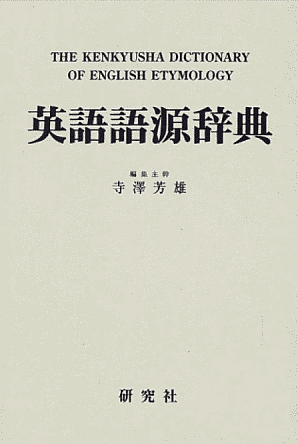
寺澤芳雄(編集主幹)『英語語源辞典』(研究社,1997年)の推し活を始めて11ヶ月ほどが経ちました.KDEE (= The Kenkyusha Dictionary of English Etymology) と略称される本辞典は日本の英語史研究の宝といってよい頼もしい存在です.本ブログでも kdee のタグのついた記事にて様々に取り上げてきました.
KDEE 推しにとって,とても嬉しいお知らせがあります.来たる6月19日に新装版が刊行されることになっているのです.研究社のサイトよりこちらのページをご覧ください.本体価格10,000円(+税)で現行版よりも値上がりしていますが,諸般の事情によるものと漏れ聞いています.それでも,この辞典がさらに普及していくために,今回の新装版刊行はおおいに歓迎すべき出来事だと思います.まだお持ちでない方は,ぜひ現行版あるいは新装版で入手され,英語史や英語語彙の学びに最大限に活用していただければ.
さて,前回の私の『英語語源辞典』推し活報告は,3ヶ月ほど前のことでした(cf. 「#5436. 私の『英語語源辞典』推し活履歴 --- 2024年3月15日版」 ([2024-03-15-1])).この3ヶ月の間にも推し活を続けてきましたので,前回の続きとして時系列で報告したいと思います.
・ 2024年3月15日 helwa のオンラインオフ会にて「『英語語源辞典』を漫然と読む/飲む」企画の第2回が開催される.
・ 2024年4月27日 朝日カルチャーセンター新宿教室にてシリーズ講座「語源辞典でたどる英語史」の開講がスタートする.1年かけて全12回の講座を毎月指定土曜日に開催予定.初回は「英語語源辞典を楽しむ」.本シリーズ講座では KDEE 以外の英語語源辞典も参照するがメインは KDEE.なお,2018年にも『英語語源辞典』に注目しつつ朝カルで英語語源講座を開いたことがある(cf. 「#3381. 講座「歴史から学ぶ英単語の語源」」 ([2018-07-30-1])).
・ 2024年5月14日 heldio/helwa リスナーの lacolaco さんによる note 上の「英語語源辞典通読ノート」にて,A の項目が踏破された旨が報告される.偉業.
・ 2024年5月18日 朝カルのシリーズ講座「語源辞典でたどる英語史」の第2回「英語語彙の歴史を概観する」が開講される.
・ 2024年6月6日 heldio にて「#1101. 『英語語源辞典』凡例読みシリーズ with 藤原郁弥さん&青木輝さん」が配信される.
・ 2024年6月8日 朝カルのシリーズ講座「語源辞典でたどる英語史」の第3回「英単語と「グリムの法則」」が開講される.
皆さんも,どのような形であれ,ぜひ KDEE 推し活にご参加いただければ!
・ 寺澤 芳雄(編集主幹) 『英語語源辞典』 研究社,1997年.
2024-03-17 Sun
■ #5438. 紙の辞書の魅力 --- 昨秋出版の『ライトハウス英和辞典 第7版』より [lexicography][dictionary][notice][lighthouse7]

昨年秋に研究社より『ライトハウス英和辞典 第7版』が出版されました.前身の『ユニオン英和辞典』が1972年に上梓されて以来,半世紀以上もの間,丁寧に改訂を重ねてきた老舗の学習者用英和辞典です.今回の第7版は紙媒体で出版されていますが,この春にはウェブ版も公開予定です.
第7版の「まえがき」では,編者の赤須薫先生(東洋大学)が「紙の辞書を使う意義」を解説しています (1--2) .ウェブ辞書が広く利用できる現在,紙の辞書を使う意義は何なのでしょうか.
それは,紙の辞書のアナログさには実にいろいろな付加価値が伴うからです.論より証拠,『ライトハウス英和辞典』を実際に手に取ってみてください.まずいろいろな意味で「見やすい」のです.全体を一気に見渡すこと,つまり俯瞰ができます.どの語がどれほどの情報を持っているのかが一瞬でわかります.色がついていて,どの情報に注目すべきか,すぐにわかるように設計されています.特に「基本語」です.誰でも知っている一見易しい語,例えば and, can, in, make, that など,実はいろいろな意味と用法があるため本当は一番難しいのです.そのため,記載されている情報の量が多いのですが,紙の辞書はその全体像を一気に捉えることができます.人間の目はよくできていて,必要に応じてズーム・イン,ズーム・アウトしてくれるのです.そして「読みやすい」活字を使って,解説をわかりやすくしてあります.また,楽しい「道草」もできます.ある単語を引こうとしていると,つい思いがけない情報に出会うことがあり,そこで思わぬ発見をしたりするのです.紙の辞書は手で引きますので,ページをめくる感覚,紙のにおい・インクのにおいといったものも伴います.また,自由に書き込んだり,マーカーを引いたり,色をつけたりすることもできます.この五感に訴えてくる感覚は紙の辞書ならではのもので,体で覚えることにつながります.これがのちのちの記憶の下支えにもなるのです.
上記の「紙の辞書を使う意義」には,私も賛同します.基本語の使い方の難しさについても同意します.
皆さんも,紙の辞書で基本語の記述を読み解く習慣をつけてみませんか?
・ 赤須 薫(編) 『ライトハウス英和辞典 第7版』 研究社,2023年.
2024-03-15 Fri
■ #5436. 私の『英語語源辞典』推し活履歴 --- 2024年3月15日版 [link][etymology][review][voicy][heldio][helwa][lexicography][kdee][hel_herald][notice][khelf][hellog][fujiwarakun][asacul][yurugengogakuradio][notice]

寺澤芳雄(編集主幹)『英語語源辞典』(研究社,1997年)の推し活を本格的に始めて8ヶ月ほどが経ちます.この期間に様々な媒体でこの辞典を推薦し,話題にしてきました.推し活に加わる方も周囲に増えてきており,喜ばしい限りです.この辺りで推し活履歴を振り返っておきたいと思います.以下,KDEE (= The Kenkyusha Dictionary of English Etymology) の略称も適宜用います (cf. kdee) .
・ 2023年7月18日 「ゆる言語学ラジオ」にお招きいただいて収録した YouTube 回「英単語帳の語源を全部知るために,研究者を呼びました【ターゲット1900 with 堀田先生】#247」が配信される.49分30秒辺りから堀田による KDEE の激推しがスタート.その後の数日間,KDEE がオンラインで入手しにくくなるという事態が発生したとか.
・ 2023年7月27日 Voicy 「英語の語源が身につくラジオ (heldio)」 にて「#787. 寺澤芳雄(編集主幹)『英語語源辞典』(研究社,1997年)のスゴさをご紹介 --- 田辺春美先生との対談」を配信し,制作にも携わられた田辺春美先生(成蹊大学)とともに KDEE の実力を語る.ちなみに,この回は2023年の heldio 配信回のリスナー投票で第8位に入った.
・ 2023年8月1日 「研究社note」より「『英語語源辞典』と活版印刷裏話」と題する記事が公開される(研究社編集部の N. A. さんが元研究社印刷社長の小酒井英一郎さんにインタビューして執筆された記事).
・ 2023年8月2日 hellog にて「#5210. 世界最強の英語語源辞典 --- 寺澤芳雄(編集主幹)『英語語源辞典』(研究社,1997年)」 ([2023-08-02-1]) が公開される.
・ 2023年9月6日 heldio にて「#828. 『英語語源辞典』(研究社,1997年)ってスゴい --- 研究社会議室での対談 (1)」が配信され,画期的なインタビューシリーズ3部作の開始となる.ちなみに,この回は2023年の heldio 配信回のリスナー投票で第5位に入った.
・ 2023年9月12日 heldio にて「#834. 『英語語源辞典』(研究社,1997年)ってスゴい --- 研究社会議室での対談 (2)」が配信される.
・ 2023年9月20日 heldio にて「#842. 『英語語源辞典』(研究社,1997年)ってスゴい --- 研究社会議室での対談 (3)」が配信される.
・ 2023年9月22日 hellog にて「#5261. 研究社会議室での3回にわたる『英語語源辞典』をめぐるインタビューが完結」 ([2023-09-22-1]) が公開される.
・ 2023年10月23日 heldio にて「#875. 『英語語源辞典』を読むシリーズ (1) --- 藤原くんと foot を語る」が配信され,藤原郁弥さんとの画期的なシリーズの幕開きとなる.ちなみに,この回は2023年の heldio 配信回のリスナー投票で第2位に入った.
・ 2023年10月26日 heldio にて「#878. 『英語語源辞典』を読むシリーズ (2) --- 藤原くんと foot を語る」が配信される.
・ 2023年11月8日 heldio にて「#891. 『英語語源辞典』を読むシリーズ (3) --- khelf 藤原くんと marble を語る第1弾」が配信される.ちなみに,この回は2023年の heldio 配信回のリスナー投票で第9位に入った.
・ 2023年11月11日 heldio にて「#894. 『英語語源辞典』を読むシリーズ (4) --- khelf 藤原くんと marble を語る第2弾」が配信される.
・ 2023年11月14日 heldio にて「#897. 『英語語源辞典』を読むシリーズ (5) --- khelf 藤原くんと marble を語る第3弾」が配信される.
・ 2023年12月15日 heldio にて「#928. 『英語語源辞典』を読むシリーズ (6) --- khelf 藤原くんと2重語 compute/count を語る」が配信される.
・ 2024年1月6日 Voicy プレミアムリスナー限定配信チャンネル「英語史の輪」 (helwa) にて「【英語史の輪 #77】umisio さんと『英語語源辞典』で England と English を精読する」が配信される.heidio/helwa リスナーの umisio さんとの差しでの KDEE 熟読会.
・ 2024年1月9日 umisio さんにより上記熟読会の手書きノートが note 上に公開される.
・ 2024年1月19日 heldio/helwa リスナーの lacolaco さんが note にて「英語語源辞典通読ノート」と題するマガジンを公開し始める.前代未聞の企画.これまでに11本の記事があり,すでに animal にまで到達している.
・ 2024年1月25日 helwa にて「【英語史の輪 #85】「『英語語源辞典』を読む(飲む)会」を画策しています」として,KDEE オンライン読書会の企画案が堀田により初めて提案される.その後,初回が2月20日に実施されることになった.
・ 2024年1月31日 heldio にて「#975. 『英語語源辞典』の収録語彙」が公開される.
・ 2024年2月2日 heldio にて「#977. 『英語語源辞典』を読むシリーズ (7) --- khelf 藤原くんと同音異義語 bank の項を精読する」が配信される.
・ 2024年2月3日 heldio にて「#978. 『英語語源辞典』の語義・初出年代 --- khelf 藤原くんと凡例を読もう」が配信される.凡例を熟読するという稀代な企画がスタート.
・ 2024年2月20日 helwa のオンラインオフ会にて「『英語語源辞典』を漫然と読む/飲む」企画が初めて実現する.
・ 2024年2月22日 helwa にて「【英語史の輪 #97】「置換」か「駆逐」か」が配信される.この配信回では,上記オンラインオフ会で話題となった KDEE 中の「駆逐」という用語が議論された.
・ 2024年3月4日 khelf による『英語史新聞』第8号が発行され,その第1面にて「『英語語源辞典』を使ってみよう」という記事(藤原郁弥さん執筆)が公開される.
・ 2024年3月5日 hellog にて「#5426. 『英語史新聞』第8号が発行されました」 ([2024-03-05-1]) が公開され,改めて KDEE が言及される.
・ 2024年3月12日 helwa にて「【英語史の輪 #105】近代英語と中英語の anigh に直接の関連はない? --- lacolaco さんも二度見した『英語語源辞典』の記述」が配信される.
以上がこの8ヶ月間の KDEE 推し活履歴です.今後の主立った予定を2点挙げておきます.
・ 本日2024年3月15日の夕方,helwa のオンラインオフ会にて「『英語語源辞典』を漫然と読む/飲む」企画の第2回が開催される予定です.
・ 新年度4月より朝日カルチャーセンター新宿教室にてシリーズ講座「語源辞典でたどる英語史」が開講される予定です.毎月1回のペースで指定土曜日に開催されます.KDEE 以外の英語語源辞典も参照しますが,メインはもちろん KDEE.なお,2018年にも『英語語源辞典』に注目しつつ朝カルで英語語源講座を開いたことがあります(cf. 「#3381. 講座「歴史から学ぶ英単語の語源」」 ([2018-07-30-1])).
皆さんも,ぜひ KDEE 推し活にご参加ください!
・ 寺澤 芳雄(編集主幹) 『英語語源辞典』 研究社,1997年.
Powered by WinChalow1.0rc4 based on chalow
